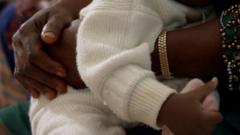Chioma firmly believes that baby Hope is her son, a miracle after eight years of unsuccessful attempts to conceive. Sitting alongside her husband Ike, the couple faces skepticism from five members of Ike’s family and the Anambra state commissioner for women affairs, Ify Obinabo. This is not merely a family dispute but a chilling case that involves Chioma's prolonged “pregnancy” of 15 months—an outlandish claim that has raised alarm bells.
Desperate for a child and under pressure from Ike’s family, Chioma sought help from a dubious clinic promising a unique “fertility treatment.” This disturbing scam exploits women hoping for motherhood and involves trafficking newborns, compounding Nigeria's existing challenges concerning high birth rates and societal pressures. The BBC’s investigation, conducted under the guise of anonymity, sheds light on a network of deception preying on vulnerable women.
As part of ongoing efforts to curb this scandal, the Nigerian government has been cracking down on such bogus clinics. These make-shift establishments lure women by claiming to offer miraculous treatments that guarantee pregnancy. Reports from women who underwent these treatments reveal experiences that often culminate in severe trauma, both physical and emotional. Most women are warned against consulting real medical professionals, with scammers insisting that no conventional tests will reveal the state of their bodies.
The BBC team makes an undercover visit to meet "Dr. Ruth," who runs one of the clinics in Anambra. The atmosphere is filled with false hope as women, some visibly pregnant, celebrate supposed positive results. “Dr. Ruth's” promises extend to bizarre suggestions such as selecting the sex of a baby through contrived treatments, deluding clients into believing that they must pay exorbitant fees for "rare" drugs that are painted as essential for a safe birth.
The investigation also reveals broader disinformation networks, particularly on social media, where misinformation about pregnancy proliferates unchecked. Within these online groups, women from various countries share increasingly implausible narratives surrounding cryptic pregnancies, often camouflaged as miraculous solutions for infertility.
Authorities continue working to dismantle these networks, raiding clinics where women are kept against their will while awaiting the fraudulent births. Interviews with individuals like Uju, another victim, illuminate the depths of despair faced by many women who consider selling their babies for financial survival.
At the conclusion of these harrowing discussions, Chioma urges commissioner Obinabo to recognize her predicament as one of victimization rather than deceit. The commissioner, grappling with the complexities of Chioma's situation, ultimately decides to allow the couple to keep Hope, provided no biological parents claim the child. Without cultural changes supporting women's reproductive rights and societal views on infertility, experts warn that such scams could persist, continuing to victimize the most vulnerable members of society.




















